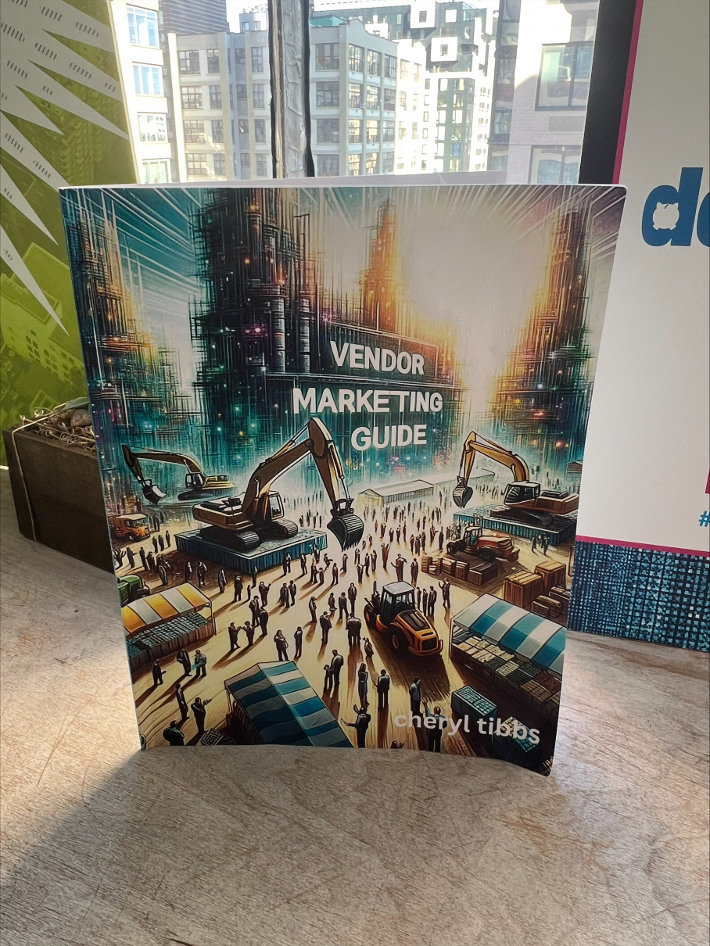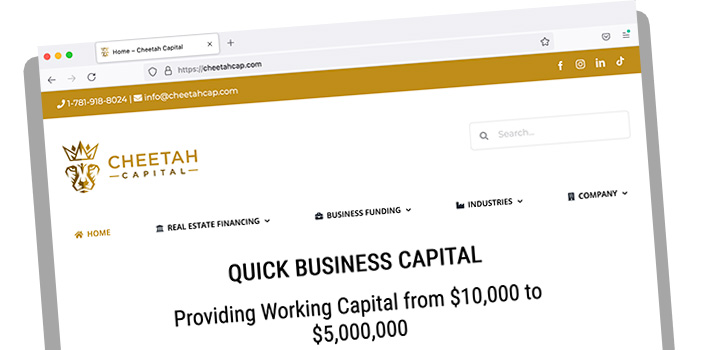When Funding Gets Personal
November 16, 2023 “We’re excited to have the opportunity to fund within the community, and then go visit, help them grow their business and everything like that…” said Benjamin Lieff, Chief Revenue Officer of Capital Gurus.
“We’re excited to have the opportunity to fund within the community, and then go visit, help them grow their business and everything like that…” said Benjamin Lieff, Chief Revenue Officer of Capital Gurus.
For an industry that has a reputation for being online, funding relationships can become quite personal. Lieff, for example, previously helped a couple with securing a lease to open a barcade in North Hollywood, California and then also did whatever he could to get them through to their grand opening including work to get their liquor license. Now, they’re actually friends.
“Not only was I able to go visit during the construction process and them opening this location but whenever I’m back in Los Angeles, I always go spend some time with him and his wife,” said Lieff. “I went to the opening party and anybody who talks to me, and they’re looking for that type of business, I always lead them there and they’re actually really blowing up. And I’m really happy to see them. I’m constantly cheering them on.”
For Funding Circle US, having an office in the big city of Denver means that some of their borrowers are coincidentally located right in their neighborhood. It’s fairly common for them to be customers of these businesses as well and they’ve actually used some for in-office catering.
“One of our favorites in Denver is called Whittier cafe. And it’s Denver’s only African espresso bar,” said Kristal Bergfield, General Manager of Strategic Partnerships at Funding Circle. The store has even been featured on Funding Circle’s TikTok.
As for Claude Darmony, President at WeFund in the Fort Lauderdale area, he knew one business quite well before the funding started.
“He was just a mechanic shop, I gave him the funds to start building gas stations next to it,” said Darmony. “It was a good friend of mine.”
While still having to go through the normal underwiting process, Darmony got to attend the grand opening after the deal went through. “It was nice,” he said.
Tips From Tibbs: Vendor Marketing Guide
November 6, 2023 The fine line between being successful and being stagnant in the equipment finance industry can easily be determined by vendor relationships. Cheryl Tibbs (CEO/Owner at Equipment Lease Co.), a veteran in the field, recently released her Vendor Marketing Guide this past October. The ten-chapter booklet covers various aspects, including vendor marketing, contact building, crafting value propositions, and more.
The fine line between being successful and being stagnant in the equipment finance industry can easily be determined by vendor relationships. Cheryl Tibbs (CEO/Owner at Equipment Lease Co.), a veteran in the field, recently released her Vendor Marketing Guide this past October. The ten-chapter booklet covers various aspects, including vendor marketing, contact building, crafting value propositions, and more.
Vendors are businesses authorized to sell equipment to end-users, Tibbs explains, and establishing a relationship with them can take a broker that is used to hunting for individual deals to instead being the recipient of multiple deals per week. But how to get that business is where most brokers get stuck.
“I think a lot of brokers get stuck with, ‘Well, how do I find vendors and what exactly is a vendor?’” she told deBanked. “I think that chapter three sticks out in particular, just making contact, knowing how to find a vendor, what to say when you get a vendor on the hook, and how to engage with that vendor.”
Tibbs said that brokers often assume that vendors already have a bank in-house when that is not always the case. This thinking might also lead them to shoot too low even when they do solicit them.
“A lot of equipment brokers they market to vendors and say, ‘Hey, send me the stuff that your people won’t finance’ and I think if you ask for trash, you’re going to get trash,” said Tibbs. If a relationship is built properly, a broker can get the vendor’s A-paper clients, she added.
Not only does the guide breakdown vendor relationships but also provides examples of how to pursue them, whether it be email, in-person, etc. The guide is not where education ends for brokers, however. Tibbs believes it’s an on-going learning experience.
“I think if you’re making money and you’re building these relationships, that’s motivation in and of itself, to continue to sharpen your knowledge with regard to this,” she said.
What’s On The Industry’s Desk?
November 3, 2023 “Just personalize your desk for others to recognize your space,” said Maria Pappas, Chief of Sales at Landfall Media Group.
“Just personalize your desk for others to recognize your space,” said Maria Pappas, Chief of Sales at Landfall Media Group.
On a typical day, individuals spend eight hours at their desk, another eight attending to tasks after leaving it, and the remaining eight hours asleep. Now this breakdown may vary from person-to-person, but it generally holds true. The office really is like a second home.
For Maryam Raya, an ISO Representative at JRG Funding, she’s currently awaiting the arrival of a piano fixture that she plans to place on her desk. As a professionally trained concert pianist, it will hold special value for her. But she’s got another classical way of jazzing up her workspace as well.
“I also absolutely love flowers and have brought bouquets on occasion to the office,” said Raya. “That’s definitely a personal touch.”
Meanwhile, Sharon Guiliano, COO at Triton Recovery LLC, believes it’s crucial for her to inspire and motivate a positive vision of success to foster a culture of positivity within her company. This is the reason she keeps her workspace with numerous motivational items. Among those is a succulent marble vase representing devotion, growth, loyalty, focus and prosperity. In one corner of her office, she even has a Birds of Paradise plant as a representation of maintaining a positive perspective on life.
“I have motivational items in my workspace that say, ‘Stay Positive, Work Hard, Make it Happen’ and ‘Live in the moment,’” said Guiliano.
For Pappas at Landfall Media Group, she keeps a fidget spinner nearby to divert her from distractions that ironically has turned into a distraction itself. And along with a photo of her kids, she has a lucky duck figurine gifted to her from her daughter displayed in front of her monitor.
“I also have my Nespresso machine for midafternoon to pick me up,” said Pappas. “Most importantly, pictures of my kids for motivation.”
Pappas’ male colleagues struggle to grasp the concept of having mascara readily available but Pappas takes it further by keeping various items within reach at the office, such as a toothbrush, floss, lipstick, and hair ties. Raya of JRG Funding, meanwhile, also always keeps her two essential items within sight. “I always carry lip gloss and a hairbrush,” said Raya. As for Guiliano, in addition to hand lotion and sanitizer, she also has promotional swag on her desk from events she’s attended.
“I do like to keep marketing items I’ve collected through the years from attending the deBanked events,” said Guiliano.
Fintech Hasn’t Stopped. There’s Still Room for Constant Improvement in Lending
October 31, 2023 “I think fintech is a broad term,” said Frank McKenna, Chief Fraud Strategist at Point Predictive. “It can apply primarily to technology that enables faster banking, and more digital banking that hasn’t been satisfied with kind of the traditional brick and mortar banks or finance companies. Fintech can be banks, it can be platforms that provide the backbone for that kind of streamline lending. Or it can even be considered companies like ours, technology that helps financial companies make better decisions.”
“I think fintech is a broad term,” said Frank McKenna, Chief Fraud Strategist at Point Predictive. “It can apply primarily to technology that enables faster banking, and more digital banking that hasn’t been satisfied with kind of the traditional brick and mortar banks or finance companies. Fintech can be banks, it can be platforms that provide the backbone for that kind of streamline lending. Or it can even be considered companies like ours, technology that helps financial companies make better decisions.”
Fintech, which can take on any one of the forms McKenna described, has been causing transformations for over a decade and yet there are still processes in the lending world still ripe for improvement.
“[Fintech is] growing every day, it will be more because of timing,” said Richard Gusmano, CEO of BCCUSA. “I think we’re going to see more and more people doing it, especially with the SBA opening up lending to non-banks. You’re going to see more of it in many different fashions and derivatives and how they see it is going to continue to emerge.”
Gusmano’s company helps businesses secure bank lines and bank loans, a system that now includes its very own AI-powered solution. He’s already seeing how AI and machine learning technologies stand to disrupt processes in the small business finance ecosystem.
“There’s so many different ways to use it and it is not rocket science,” Gusmano said. “In the MCA space, it’s amount of deposits, it’s average daily balance, it’s business type, and other positions. AI can immediately pick up those things if programmed to do so. I would think that the MCA underwriters over time should be concerned because AI could likely do that and pick that up.”
But it’s not just about replacing manual processes, but also doing it in an efficient manner.
“Since most fintech is dealing in a non-face to face environment, you’re going to have a whole host of risk in fintech, more than you might have in a traditional bank,” said McKenna of Point Predictive, whose company collaborates with lenders to detect potential risks. “I can just name off five or six: you have higher rates of identity theft, use of fake IDs called synthetic identities, you have more falsified documentation, fake employers, people shot-gunning where they’ll go to multiple fintechs the same day and get as many loans as they can, as quick as they can. They call it shot gunning.”
McKenna added that if someone has no knowledge of how to navigate these types of strategies or does not have the right technology to handle it, they may fall victim to them.
The keyword there might be someone, as in a person
“The risks associated is that you still are going to need someone that can make human decisions, even with financial technology,” said Gusmano. “And if you don’t, you’re going to be keeping yourself away from businesses that you want to do business with. It can never be 100% tech.”
Nice Yacht, Someone Financed It
October 26, 2023 Every sentence sounds better ending with the word “yacht.” Enjoying crackers and cheese on a yacht. Sipping champagne aboard a luxurious yacht. Even making money financing high-end yachts, the charm remains intact. Over the past six years, East Harbor Financial has been offering a range of financing solutions under their Luxury Assets category, which includes exotic cars, aircraft, and vessels. While the company has been in business for 11 years, President Bruno Raschio’s foray into the yacht industry provides a unique perspective from an outsider turned insider.
Every sentence sounds better ending with the word “yacht.” Enjoying crackers and cheese on a yacht. Sipping champagne aboard a luxurious yacht. Even making money financing high-end yachts, the charm remains intact. Over the past six years, East Harbor Financial has been offering a range of financing solutions under their Luxury Assets category, which includes exotic cars, aircraft, and vessels. While the company has been in business for 11 years, President Bruno Raschio’s foray into the yacht industry provides a unique perspective from an outsider turned insider.
According to Yatco.com, there are currently 592,000 yachts in the United States and the global market size was valued at $8.91 billion in 2022, with expectations to expand 5.8% from 2023 to 2030. The most Raschio has ever financed on one unit was $2 million and he admits there is a lot of money to be made in this sector, but people must be willing to welcome the risk that comes with it.
“Lenders who embrace risk and identify a specialized market can consistently generate profits in a business,” said Raschio. “Nonetheless, market corrections often possess the capability to level out the gains amassed during prosperous years.”
Raschio emphasized that the industry has many brokers that do not necessarily need an in-depth knowledge on yachts. Nevertheless, the significance of understanding yachts itself is always advantageous. In the case of private lenders, like his own company, Raschio advised focusing on financing high-quality yachts that possess strong market appeal and retain their value.
With the increase in manufacturing costs, Raschio states that prices may not revert to pre-Covid rates, like when they initially joined the yacht industry. For instance, A-credit rates, which used to range from 4½ to 5% before the pandemic, have now risen to 8 to 9%. Similarly, rates for B, C, and D credit ratings, previously between 10 to 13%, have surged to 14 to 19%.”
 “Consider this scenario, if you were buying a million-dollar yacht before, you’d typically put down 30%, leaving you with a financing amount of $700,000,” he said. “However, in a post-Covid market, if the same yacht is selling for $1.5 million and you still put down 30%, you’d be looking at financing $1,050,000. That means you’re financing nearly $50,000 more than its pre-Covid value.”
“Consider this scenario, if you were buying a million-dollar yacht before, you’d typically put down 30%, leaving you with a financing amount of $700,000,” he said. “However, in a post-Covid market, if the same yacht is selling for $1.5 million and you still put down 30%, you’d be looking at financing $1,050,000. That means you’re financing nearly $50,000 more than its pre-Covid value.”
East Harbor specializes in financing high-end yachts, brands like Sunseeker, Azimut, Ferretti, Pershing, and Princess. Transactions typically range from $600,000 to $1 million, covering yachts that fall within the 40 to 75-foot size range. Working with clients nationwide, the primary regions where the company provides financing are South Florida, which is the largest market, California’s Newport Beach, the second largest, and various areas along the east coast, the third-largest market. The company exclusively offers short-term loan options, typically lasting between 5 to 8 years, as opposed to the more common 15 to 20-year loan terms for yachts.
“We prefer to expedite our financing process since we rely on private funding,” Raschio explained. “Furthermore, this type of financing is generally costlier than traditional bank loans. Therefore, many individuals find it more sensible to present it as a short-term solution, where you secure your financing, achieve your objectives, and exit, or sell the boat.”
Upon entering the boat financing business, Raschio first’s client came to him with a million-dollar yacht with a $500,000 down payment. It seemed like a solid deal, but there was also a high likelihood that the yacht was going to need very expensive repairs. Its details like this that can change the entire dynamics of the deal and it was a teaching moment for him.
“As an example, a major repair on a used yacht that’s heavily depreciated could cost more than the entire used yacht price,” said Raschio.
With Fraud on the Rise, AI Can Fill in the Gaps
October 19, 2023 In today’s dynamic world of fraud detection, technology, and artificial intelligence (AI) are allies. The insights of industry experts, Yinglian Xie, a technology veteran with a background at Microsoft Research and CEO at DataVisor, Sandip Nayak, President at Fundation, and Andrew Davies, Global Head of Regulatory Affairs at ComplyAdvantage, discuss the transformative role of AI in fraud prevention.
In today’s dynamic world of fraud detection, technology, and artificial intelligence (AI) are allies. The insights of industry experts, Yinglian Xie, a technology veteran with a background at Microsoft Research and CEO at DataVisor, Sandip Nayak, President at Fundation, and Andrew Davies, Global Head of Regulatory Affairs at ComplyAdvantage, discuss the transformative role of AI in fraud prevention.
When DataVisor started, it primarily offered advanced machine learning solutions, through an unsupervised approach. In other words, their programs can spot fraud without needing a loss or training labels; they can automatically identify suspicious activities. Xie explains that AI’s ability to make rapid decisions during real-time transactions depends on the amount of data available for this process. To achieve a proactive response, it must be synchronized with real-time data, as opposed to a manual or “supervised machine learning” approach.
“We need to kind of switch the traditional approach looking at fraud being very much kind of an isolated case, like a manual approach, and into something we need technology for, said Xie. “And we need to essentially be able to make decisions instantaneously as well.”
In addition to unsupervised learning algorithms, Xie explains that generative AI falls into another category of fraud detection. This method describes the data and communicates information back in human-like responses. Xie gives an example that as customers, some may not understand why a transaction was rejected and that’s where generative AI comes to rationalize the reason behind the rejection.
Echoing Xie, Nayak described solutions where traditional techniques fail, one of them being unsupervised learning algorithms. These algorithms can use techniques like anomaly detection to actually hone in on “the needle in a haystack problem.”
“Number two, the automated and advanced nature of AI can really solve the shortcomings of rules based and human based approaches in detecting fraud and can also self-calibrate itself as the nature of fraud evolves with time,” said Nayak.
Meanwhile, Andrew Davies pointed out that one of the biggest challenges faced by banks and financial institutions is “they are constantly playing catch-up.” With the accelerated pace of money movement and real-time settlement, he emphasized that fraudsters capitalize on this by being swift and innovative, continuously seeking out new vulnerabilities to exploit.
“Banks must update their legacy technology which leaves too many weak points in the control environment,” said Davies. “Additionally, as money moves more quickly and is subject to finality, fraud detection must be done in real time.”
And as the digital landscape continues to evolve, Nayak envisions the adoption of these technologies will be beneficial to the lending industry. Embracing different strategies not only reduces fraud losses but also enhances capital efficiency, paving the way for increased profitability and security in lending, according to Nayak.
“I do expect the lending industry, especially the ones who adopt the latest technologies of fraud detection, will have a competitive advantage compared to those who don’t,” said Nayak. “And what that will do is it will help them preserve more of their capital in the current tough macro environment by helping the overall unit economics…”
Unsupervised machine learning and generative AI are strategies reshaping fraud prevention. The ability to make rapid, data-driven decisions, adapt to evolving fraud tactics, and provide human explanations behind alerts has become a cornerstone in modern fraud detection.
Sales Slump? There’s Ways to Overcome It
October 9, 2023 From beginning as an entry level rep seven years ago to his current role as the Director of Sales and Operations at Tip Top Capital, Sergio Zamudio has gained a deep appreciation for the importance of maintaining motivation, especially during slower weeks. A slump can get even a good salesperson down so he encourages a shift in perspective. Instead of focusing on the number of contacts made in a day, one should evaluate how many of those contacts can become qualified prospects.
From beginning as an entry level rep seven years ago to his current role as the Director of Sales and Operations at Tip Top Capital, Sergio Zamudio has gained a deep appreciation for the importance of maintaining motivation, especially during slower weeks. A slump can get even a good salesperson down so he encourages a shift in perspective. Instead of focusing on the number of contacts made in a day, one should evaluate how many of those contacts can become qualified prospects.
“It’s kind of like the marble theory,” Zamudio said, “if I throw a certain amount of marbles in a jar, how often do I come across a blue marble? Well, as long as I keep digging, and I keep looking, I’m going to get something.”
To inspire the team, Tip Top offers various incentives. The top producers in the office are recognized with a monthly trophy. And weekly rewards are given out, which can range from tickets to a Giants game or seats at a Broadway show. The underlying idea is to encourage the team to focus on what they can control, such as striving for another sale, rather than dwelling on tough days beyond their control.
“What we do to try to get people motivated and going is that we like to do bonus incentives,” said Zamudio, “We do this thing called a monthly trophy. Everybody’s very goal oriented and tries to beat one another to try to win the trophy, which goes to the top producers in the office.”
For Gerald Watson, CEO of the Watson Group, 25 years of experience has taught him a few things. When a week is slow, sales reps should “look at their existing book of business, whether it’s people they’ve done fundings for or even prospects,” he said. His advice is that reps should engage them in discussions about other financing products they might require. “Same customer, new products, that’s a real fundamental business strategy,” Watson said.
If all else fails, get accustomed to asking for referrals. Ending an interaction with something as simple as, “’Oh by the way, do you know anyone that…’” can go a long way,” Watson explained. “If there’s no opportunities with existing clients, you always want to get into the habit of asking for referrals.”
Will Murphy, COO at Everlasting Capital, is no stranger to a slump. The company started with one back in 2012 when his partner was making 400 calls a day for three months with no success. Finally, after all that, a deal got funded and it encouraged them to keep at it. While maintaining determination is certainly woven in to the fabric of their sales culture, Murphy also cited the importance of checking in on clients constantly. “We have a lot of trade secrets that we’ve learned over the years that we’ve implemented into play to (1) stay in front of the client, (2) stay in front of renewals, and (3) provide the best customer service that we possibly can because you got to stay relevant in this industry, or you’ll pretty much be forgotten,” said Murphy.
This Funding Shop Puts Students on the Phone for College Credit
October 5, 2023 “We figured out the best way is to recruit,” said Khoury.
“We figured out the best way is to recruit,” said Khoury.
Chris Khoury, CEO of Cheetah Capital, isn’t just hiring talent; he’s teaching it. He introduced a funding academy for college students in the summer of 2022. It’s an actual internship program that is specially tailored to recruit and train aspiring brokers and sales reps and teach them everything from the ground up.
Starting in the business three years ago, Khoury eventually went on to establish Cheetah Capital. He recognized the challenges in finding quality hires in the industry and decided to tackle it head-on with the creation of the program.
“[The interns] learn various skills such as cold calling, crafting professional emails, and acclimating to the corporate environment,” said Khoury. “Our program aims to provide valuable real-world experience that complements their academic learning to develop in business, marketing, and communication. They also gain experience understanding the world of financial services.”
The program is a collaboration between Khoury, Jonah Farella (Director of Sales & Business Development), and Joe Zampell (COO). The program is split into three “spots” (Spot 1, 2, & 3), where they each mentor 10-15 students and assess them on a weekly basis. Each student has an individual mentoring session each week and a team meeting every Monday.
Based in Boston, Cheetah Capital partners with local institutions such as UMASS, Boston University, Boston College, and Endicott College. Many of these schools have accredited their students with college credits upon validation from their team but interns are also compensated for their efforts.
“For Fall 2023, we’ve taken a slightly different approach,” said Khoury. “Rather than our usual remote/and in person internships, we’ve partnered with local Boston schools for a fully in-person co-op experience. These students dedicate their full semester to Cheetah Capital, working regular 9-5 hours, immersing themselves in a comprehensive professional environment.”
Chris Bearden, a current intern from Endicott, discovered the program on LinkedIn and secured an interview with Farella. Considering he is required to complete a 32-hour weekly internship in his senior year, Bearden has decided to cut his teeth in business in the world of b2b finance sales. He actually started at Cheetah this past June despite the internship program not officially starting until the fall. The program, he told deBanked, started off with a lot of training and he says it’s prepared him to be able to talk more confidently to business owners and in general. He mused about the “100 different stories” he’s heard daily. “Everyone will tell you something different,” he said.
“The most I’ve made on a sale so far is $8,000 off of one deal,” Bearden shared. “That was really exciting, I can’t really describe the feeling being 22 years old and coming off of a phone call understanding that I just made that much money. But I think one thing that they have taught me at Cheetah Capital is just to keep your head down and kind of keep going…”
Farella, who oversees the program, also started out as an intern himself. As a graduate from Boston College, he was mentored by Khoury and he adapted to the industry quickly. Once he started closing deals and making money he realized, “I’m making more money than I ever have.” Helping the interns in his program at the time later turned into an offer from Khoury on running the program.
“Right now, we cap at around 45-50 [students] and that’s because we only have them for about three months,” said Farella. “But as it grows, and we bring in more managers, what we want to do is kind of offer interns a return offer.”
Offering real-world work experience to students while building up quality employees has felt like a win-win for Cheetah.
“We try to take good well-rounded kids here and teach them what we wish we knew at their age,” said Khoury.






























